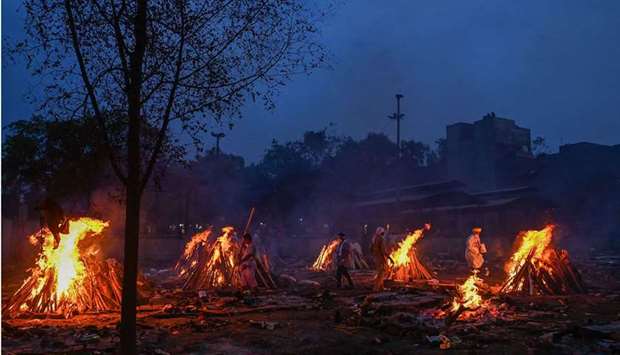India's opposition leader Rahul Gandhi on Friday demanded the government rapidly vaccinate the entire country and scientifically track the coronavirus in an effort to curb a deadly second wave which saw 1.5 million new cases in a week.
‘Your government's lack of a clear and coherent Covid and vaccination strategy, as well as its hubris in declaring premature victory as the virus was exponentially spreading, has placed India in a highly dangerous position,’ Gandhi said in a letter addressed to Prime Minister Narendra Modi on Friday.
Modi has been widely criticised for not acting sooner to suppress the second wave, after religious festivals and political rallies drew tens of thousands of people in recent weeks and became ‘super spreader’ events.
His government has also been criticised for lifting social restrictions too soon following the first wave and for delays in the country's vaccination programme, which medical experts say is India's only hope of controlling the second Covid-19 wave.
While India is the world's biggest vaccine maker, it is struggling to produce and distribute enough doses to stem the wave of Covid-19.
The Hindustan Times newspaper on Friday demanded: ‘Accelerate the vaccine drive, get the second wave of the pandemic under some control...’
Modi has stressed that Indian states must keep up vaccination rates. Although the country has administered at least 157 million vaccine doses, its rate of inoculation has fallen sharply in recent days.
‘After having achieved a rate of around 4 million a day, we are now down to 2.5 million per day due to vaccine shortages,’ Amartya Lahiri, an economics professor at University of British Columbia was quoted as saying in the Mint newspaper.
‘The 5 million a day target is the lower bound of what we have to aim for, since even at that rate, it will take a year for us to get everyone two doses. The situation unfortunately is very grim.’
The European Union on Thursday backed a US proposal to discuss waiving patent protections for Covid-19 vaccines in an effort to increase the supply and access to vaccines, especially in vulnerable developing countries.
India reported another record daily rise in coronavirus cases, 414,188, on Friday, bringing total new cases for the week to 1.57 million. Total cases now stand at 21.49 million. Deaths from Covid-19 rose by 3,915 to 234,083.
Medical experts say the real extent of Covid-19 in India is five to 10 times the official tallies.
NEW EPICENTRE IN SOUTHERN STATES
India's healthcare system is crumbling under the weight of patients, with hospitals running out of beds and medical oxygen. Morgues and crematoriums can not handle the number of dead and makeshift funeral pyres burn in parks and carparks.
Infections are now spreading from overcrowded cities to remote rural villages that are home to nearly 70% of the 1.3 billion population.
Although northern and western India bear the brunt of the disease, southern India now seems to be turning into the new epicentre. The share of the five southern states in the country's daily surge in infections rose from 28% to 33% in the first seven days of May, data shows.
In the southern city of Chennai, only one in a hundred oxygen supported beds and two in a hundred beds in intensive care units (ICUs) were vacant on Thursday, from a vacancy rate of over 20% each two weeks ago, government data showed.
In India's tech capital Bengaluru, also in the south, only 23 of the 590 beds in ICUs were vacant, and only 1 in 50 beds with a ventilator were vacant, a situation officials say points to an impending crisis.
Bengaluru has 325,000 active Covid-19 cases, with demand for ICU and high-dependency unit (HDU) beds up more than 20 fold, said H. M. Prasanna, president of the Private Hospitals and Nursing Homes Association in Karnataka state, which includes Bengaluru.
‘Every patient coming to the hospital needs a ICU or a HDU bed...that is why patients are running from one hospital to another searching for an ICU bed,’ he said.
‘There is also short supply of medical oxygen...Most of the small hospitals now who can't procure oxygen on a daily basis are refusing to admit Covid patients.’
Several Indian states have imposed various levels of social restrictions to try to stem infections, but the federal government has resisted imposing a national lockdown.
Aid from foreign countries continued to pour in, as consignments from Poland, Netherlands and Switzerland reached India on Friday, foreign ministry spokesman Arindam Bagchi said on Twitter.

